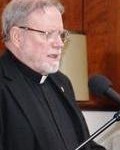by Fr. Patrick Henry Reardon
 Senior Editor of Touchstone Magazine, and archpriest of All Saints Orthodox Church in Chicago, IL, Fr. Patrick is, perhaps, the most erudite writer in the Orthodox Church in North America today. This article, one of his Pastoral Ponderings, was published by Orthodoxtoday.org.
Senior Editor of Touchstone Magazine, and archpriest of All Saints Orthodox Church in Chicago, IL, Fr. Patrick is, perhaps, the most erudite writer in the Orthodox Church in North America today. This article, one of his Pastoral Ponderings, was published by Orthodoxtoday.org.
When Nicodemus came to Jesus by night, the Lord’s first words presented him with a challenge:
“Amen, amen, I say to you, unless a person is born anew, he cannot see the kingdom of God” (John 3:3).
The Greek adverb translated here as “anew” is another, which is deliberately ambivalent. Literally it means “from above,” but this expression may be taken in two ways: It can mean “from on high” or “from the top.” If the latter sense is understood, the meaning is “anew” or “again.” (One thinks of our English idiom, “let’s take it again from the top.”) That is to say, there are two aspects to this birth: It is new, and it is from on high. Very early John’s gospel had spoken of this rebirth:
“But to as many as received Him He gave the authority to become children of God, to those who believe in His name: who were born, not of blood, nor of the will of the flesh, nor of the will of man, but of God” (1:12-13).
Nicodemus, in his bewildered response to Jesus’ assertion, understands it simply to mean “again”: “How can a man be born when he is old? Is he able to enter a second time into his mother’s womb and be born?” (emphasis added) When Jesus answers this question, however, it is the spiritual manner of this rebirth—-the “from above”—-that receives the accent:
“Amen, amen, I say to you, unless one is born of water and the Spirit, he cannot enter the kingdom of God. What is born of the flesh is flesh, and that which is born of the Spirit is spirit” (3:4-6).
In the preaching of John the Baptist, there was a contrast between baptism with water and baptism with the Holy Spirit:
“I indeed baptized you with water, but He will baptize you with the Holy Spirit”(Mark 1:8; cf. Matthew 3:11).
This contrast is also found in the Fourth Gospel with respect to Baptism:
“I saw the Spirit descending from heaven like a dove, and He remained upon Him. I did not know Him, but He who sent me to baptize in water said to me, ‘Upon whom you see the Spirit descending, and remaining on Him, this is He who baptizes in the Holy Spirit'” (1:32-33).
In the conversation with Nicodemus, however, both aspects of the rebirth are spoken of—-both the water and the Spirit. John clearly has in mind here the theology of Christian baptism. In this Christian mystery, there is no real distinction between baptism in water and baptism in the Holy Spirit. There is only “one Baptism” (cf. Ephesians 4:5).
This double aspect of renewal was already spoken of in prophecy:
“I will sprinkle clean water on you, and you shall be clean; I will cleanse you from all your filthiness and from all your idols. I will give you a new heart and put a new spirit within you; I will take the heart of stone out of your flesh and give you a heart of flesh. I will put My Spirit within you” (Ezekiel 36:25-27).
Jesus’ words to Nicodemus, however, stress the Spirit more than the water, because the gift of the Holy Spirit distinguishes Christian baptism from that of John. Jesus goes on:
“What is born of the flesh is flesh, and that which is born of the Spirit is spirit. Do not marvel that I said to you, ‘You must be born again'” (John 3:6).
The distinction now is not between water and the Spirit, but between flesh and the Spirit. The flesh is that which dies, whereas the Spirit gives life. Later in John, Jesus says,
“It is the Spirit who gives life; the flesh profits nothing. The words that I speak to you are spirit, and life” (6:63).
What, then, does it mean to be reborn in the Spirit? According to Jesus’ words, it certainly involves Baptism. Clearly, however, it involves more, as Jesus indicates when He says,
“The Spirit breathes where He wills, and you hear His voice, but cannot tell where He comes from and where He goes. Thus is everyone who is born of the Spirit” (3:8).
Our Lord suggests here an incomprehensible mystery involved in man’s rebirth. It can be recognized, but it transcends understanding. As the Spirit’s activity, man’s rebirth cannot be explained. Both its origin and its goal—-“where He comes from and where He goes”—-elude man’s scrutiny. Only Jesus Himself can legitimately speak of what the Spirit does:
“We speak what We know and testify what We have seen” (3:11).
This mystery of man’s rebirth, however, can be taken as the implied subject matter of John’s whole gospel. Each chapter addresses the question,
“What does it mean to be born again from on high?”
Fr. Patrick Henry Reardon is archpriest and pastor of All Saints Antiochian Orthodox Church in Chicago, Illinois, and a Senior Editor of Touchstone: A Journal of Mere Christianity.
